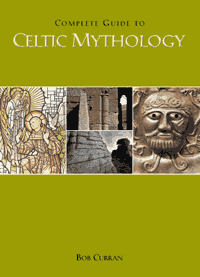 |

|
|||
 Oisín’s Return from the Otherworld Oisín was the son of the great war-leader Fionn MacCumhaill. The tale of his abduction into the Otherworld, or Tír na nÓg – The Land of Youth – is part of the Fenian, or Fionn, Cycle of Irish Mythology. Bewitched by Niav of the Golden Hair, a daughter of the king of the Otherworld, he found that once he entered the Land of Youth he could not escape and was forced to marry her. Longing to return to his own country, he began to pine, much to the distress of his wife. Grudgingly, she allowed him to return to the mortal world, for a day, on the understanding that he should not set foot either on his own land or on the earth of Ireland. Niav gave him an enchanted horse on which he could visit his old haunts and estates.The speed of the horse seemed to increase as it galloped through the countryside. It was moving so swiftly that Oisín saw only glimpses of the landscape around him. He noticed a subtle change to the landscape. Where there had been wild and untamed moorland and bog, the haunt of wild animals and birds, there were now bordered and cultivated fields, in which cattle grazed and crops had been planted. Where there had been desolate stretches of waste and rock, there were now clusters of small cottages that sent their smoke curling lazily into the air, and tended gardens, where men worked raising small crops of potatoes. Even the roads seemed somehow changed: where there had been no more than grassy tracks, leading off into the forests or mountains, they now seemed well paved and better laid-out with stones and proper borders. The countryside seemed to have undergone changes that would have taken decades to complete. Oisín came upon several men who were trying to move a large rock which lay in the middle of the road. An old man sat on a rock by the roadside, watching and directing four younger men as they pushed and strained to remove the obstacle. They had no success and, as he looked at them, Oisín realised that they were smaller and less muscular than the men with whom he had fought in the great days of the Fianna. The men all looked up as he pulled his horse up alongside them.
‘Is this the road to Royal Tara?’ asked Oisín. The young men eyed him warily.
‘There has been no High King at Tara for countless years!’ He spoke in the same strange accent as the first speaker and there was a general murmur of consent among the men gathered by the roadside. Suddenly afraid, Oisín felt for his sword and said: Oisín's mind reeled from what he had been told. And yet, such a thing would explain the changes that he'd seen as he hurtled through the Irish countryside on his way here.
‘You lie, old man,’ Oisín spat. ‘How can nearly four hundred years have passed, when I know that I've spent only a few days in the Otherworld?’ Leaning down from the saddle of the horse, he took a grip on the stone and began to move it. The young men watched in astonishment. Slowly, and with some difficulty, the stone was eased to the side of the roadway. Strangely, Oisín found the rock heavier than he had imagined it would be – perhaps his famed warrior-strength had diminished a little in the Otherworld. As he leant forward to get a grip on the sides of the stone, the strap that secured his saddle snapped. At the same time, the snorting steed moved forward a little and Oisín found himself tumbling to the ground. Instinctively, he thrust out a foot to save himself, touching the ground only for an instant. The moment the sole of his boot touched the earth of the human world, Oisín felt a tremor run through his entire body, and remembered what Niav had said: ‘Do not set your foot on the ground Oisín or you will be lost, both to this world and your own’. The others stared at him in wonder, as Oisín, son of Fionn MacCumhaill and mighty hero of the Fianna aged before their eyes. In a moment, he had become an old man with shaggy hair and a white beard, fearfully bowed over and marked with all the signs of a long and careworn life. Even then the change was not complete, and as they watched, the ancient creature crumbled into a fine, grey dust that began to blow away in the wind.
From Complete Guide to Celtic Mythology by Bob Curran |
[ Back to top ]
All Material © 1999-2006 Irelandseye.com and contributors

